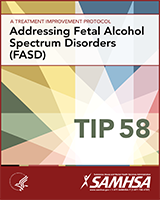NCBI Bookshelf. A service of the National Library of Medicine, National Institutes of Health.
Center for Substance Abuse Prevention (US). Addressing Fetal Alcohol Spectrum Disorders (FASD). Rockville (MD): Substance Abuse and Mental Health Services Administration (US); 2014. (Treatment Improvement Protocol (TIP) Series, No. 58.)
The Treatment Improvement Protocol (TIP) series, which has been published by the Substance Abuse and Mental Health Services Administration (SAMHSA) within the U.S. Department of Health and Human Services (HHS) since 1993, has generally offered best-practices guidelines for the treatment of substance use disorders. For this TIP, the Center for Substance Abuse Prevention (CSAP), a sub-agency within SAMHSA, has drawn on the experience and knowledge of clinical, research, and administrative experts. As behavioral health disorders are increasingly recognized as a major problem, the audience for the TIPs is expanding beyond public and private treatment facilities to include practitioners in mental health, criminal justice, primary care, public health, and other healthcare and social service settings.
The recommendations contained in each TIP are grounded in an evidence base. Evidence includes scientific research findings and the opinion of the TIP consensus panel of experts that a particular practice will produce a specific clinical outcome (measurable change in client status). In making recommendations, the consensus panel engages in a process of “evidence-based thinking” in which they consider scientific research, clinical practice theory, practice principles, and practice guidelines, as well as their own individual clinical experiences. Based on this thinking, they arrive at recommendations for optimal clinical approaches for given clinical situations. Relevant citations (to research outcome reports, theoretic formulations, and practice principles and guidelines) are provided.
TIP Format
This TIP is organized into three parts:
- Part 1 for behavioral health practitioners focuses on providing appropriate counseling methods and frameworks.
Ideally, it is envisioned that a supervisor might assemble a small group of counselors, distribute copies of this TIP (which are free), and begin a series of six or so meetings where the materials in the TIP would be reviewed, discussed, and in other ways used as an educational and training vehicle for the improvement of treatment skills (with the particulars of how this training would be done determined by the individual supervisor, based upon her or his unique situation, needs, and preferences). Thus, after a relatively short period of time and with only limited additional resources, this TIP could help to meet the challenge of fostering a specific kind of improvement in service delivery.
Development Process
The need for this TIP was identified through a collaborative discussion with leadership from each of SAMHSA's three Centers; CSAP, the Center for Substance Abuse Treatment (CSAT), and the Center for Mental Health Services (CMHS). Two consensus panels of experts were convened; one for clinical issues, and the other for administrative guidelines. The TIP was then field reviewed by an external group of subject matter experts, who provided suggestions for further refining the document (see appendix J).
TIPs Online
TIPs can be accessed via the Internet at http://store.samhsa.gov/home. The online Addressing Fetal Alcohol Spectrum Disorders: Part 3, A Review of the Literature, which will be updated periodically, is available at http://store.samhsa.gov/home.
Terminology
Throughout the TIP, the term “behavioral health” is used to refer to both substance abuse treatment and mental health settings. (The term can, in fact, refer to many types of health settings, but the primary audiences for this TIP are substance abuse treatment and mental health providers.) The term “substance abuse” has been used to refer to both substance abuse and substance dependence (as defined by the Diagnostic and Statistical Manual of Mental Disorders, 5th edition [DSM-5] [American Psychiatric Association 2013]). This term was chosen partly because substance abuse treatment professionals commonly use the term “substance abuse” to describe any excessive use of addictive substances. In this TIP, the term refers to the use of alcohol as well as other substances of abuse. Readers should note the context in which the term occurs in order to determine what possible range of meanings it covers; in most cases, however, the term refers to all varieties of substance use disorders described by the DSM-V.
- What Is a TIP? - Addressing Fetal Alcohol Spectrum Disorders (FASD)What Is a TIP? - Addressing Fetal Alcohol Spectrum Disorders (FASD)
Your browsing activity is empty.
Activity recording is turned off.
See more...
